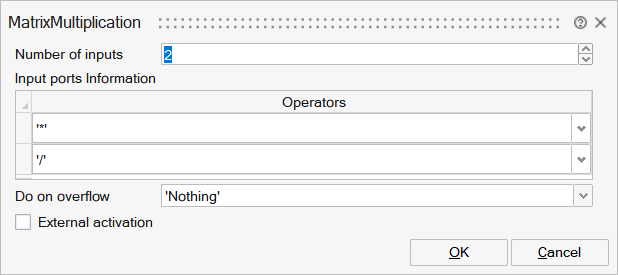MatrixMultiplication
This block computes the matrix multiplication or division of input matrices. For the multiplication, regular matrix multiplication size rules apply: the number of rows of a matrix must be equal to the number of columns of the next matrix. For the division, the matrix must be square. This block supports all the integer, real and complex data types.
![]()
Library
Activate/MatrixOperations
Description
This block computes the matrix multiplication or division of input matrices. For the multiplication, regular matrix multiplication size rules apply: the number of rows of a matrix must be equal to the number of columns of the next matrix. For the division, the matrix must be square. This block supports all the integer, real and complex data types.
Parameters

| Name | Label | Description | Data Type | Valid Values |
|---|---|---|---|---|
nin | Number of inputs | Number of block inputs. | Number | |
in_ports | Input ports Information | Information about the input ports. | Structure | |
in_ports/sgn | Operators | * indicates the corresponding input is to be multiplied with other inputs. | Cell of strings | '*' |
overflow | Do on overflow | Flag to not take a specific action if integer overflow occurs. Default: 'nothing' | String | 'Nothing' |
externalActivation | External activation | Specifies whether the block receives an external activation or inherits its activation through its regular input ports. When External Activation is selected, an additional activation port is added to the block. By default, external activation is not selected. | Number | 0 |
Ports
| Name | Type | Description | IO Type | Number |
|---|---|---|---|---|
Port 1 | explicit | output | 1 | |
Port 2 | explicit | input | nin | |
Port 3 | activation | input | externalActivation |
Advanced Properties
| Name | Value | Description |
|---|---|---|
always active | no | |
direct-feedthrough | yes | |
zero-crossing | no | |
mode | no | |
continuous-time state | no | |
discrete-time state | no |